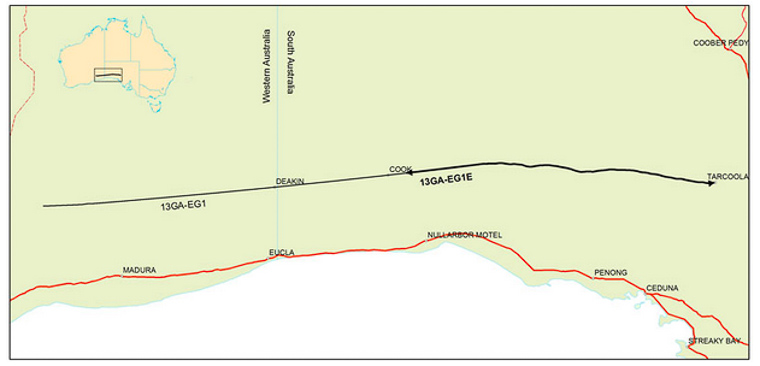First glimpse of potential Nullarbor treasures
SOME of the first geological images of one of the world's last unexplored mineral frontiers have glimpsed the mining potential of Australia's vast Nullarbor Plain.
The images of the Earth's crust to a depth of 60 kilometres spanning a 484km stretch follow Australia's transcontinental rail line between Cook in South Australia to Haig in Western Australia.
The new images, released this month, have identified a number of large geological structures - an important first step to understanding the opportunities for mineral exploration within this frontier setting.


Dr Rian Dutch from the Geological Survey of South Australia said the new imagery would give explorers a much better idea where to search to locate mineral deposits of economic value near the earth's surface.
"The Nullarbor is a genuine, greenfield exploration area, so every little bit of information is a major value-add. When we combine ground seismic and airborne study results with information of the crustal conductivity, we can see dynamic regions where major crustal-scale structures come near the earth's surface," he said.
"These areas are generally more prospective as they provide pathways for fluids and magmas from the earth's mantle to migrate into the upper-crust, potentially carrying valuable metals within reach of the surface.
"With all of that information we're going to get a much better idea of what's going on with the geology there and what the area might be prospective for and this will lead to new exploration in the region."
The Geological Survey of South Australia in collaboration with Geoscience Australia and the Geological Survey of Western Australia produced the images as part of a non-intrusive ground seismic survey.
The latest release is the final leg of the largest study of its kind undertaken in Australia and completes a two- year, 834km study transect from Tarcoola in South Australia to Haig in Western Australia. The area is about 800km northwest of Adelaide, the capital of South Australia.


The collaborative work has generated two sets of seismic imagery: the first provides a snapshot of the earth's crust to 60 km depth, while the second shows the top 15km in greater detail.
Dr Dutch said the Geological Survey of South Australia would conduct a drilling program in early 2017 to further assess the area.
He said the area had been opened up to application bids, which a number of companies were considering.
"It's remote but it's not so remote because it's got a major highway and a railway running right through the middle of it and it's very flat," he said.
"The reason why it's such a big frontier is because until we had done this work we had no idea how thick those limestone covers were.
"This work has shown that the cover's only 300-400m thick - the same sort of thickness as the cover over Olympic Dam - if you have a high grade deposit it becomes economic at those sorts of depths.
"In terms of the potential, it's hard to tell at the moment because the data's limited as to where the best spots are going to be but there are a couple of interesting anomalies on the South Australian side that have got a lot of people interested."
The South Australian Government contributed $1.75 million through its PACE program to the South Australian segment of the $3.15 million project with collaborative partners Geoscience Australia and AuScope Earth Imaging providing the remaining $1.4 million.
South Australia is a globally important producer of copper, uranium and zircon. The state also produces iron ore, zinc, lead, silver, industrial minerals (including salt, silica sand and gypsum) and extractive materials (including dimension stone and opal).
The arid Nullarbor Plain is the world's largest single exposure of limestone bedrock, and stretches about 1100km from east to west at its widest point.
It is also home to the longest straight section of railway in the world (478 km) and the longest straight section of highway in Australia (146.6 km).
By Andrew Spence